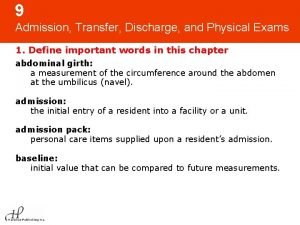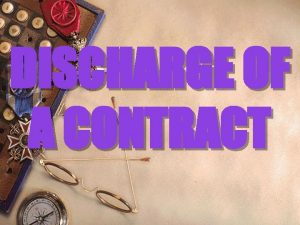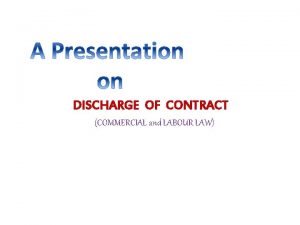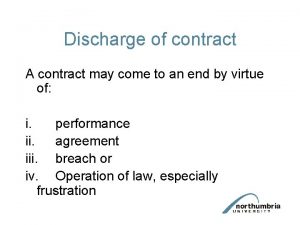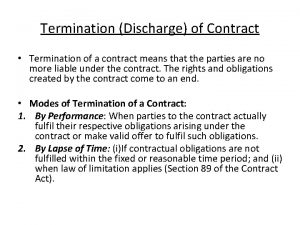Discharge of Contract Discharge of Contract Discharge of















- Slides: 15

Discharge of Contract

Discharge of Contract Ø Discharge of a contract implies termination of the contractual relationship between the parties. 1. By Performance 2. By Mutual Consent or Agreement 3. By Subsequent or Supervening Impossibility 4. By Lapse of Time 5. By Operation of Law 6. By Breach of Contract

Discharge by Performance A. Actual performance When each party to a contract fulfils his obligation arising under the contract within the time and in the manner prescribed. B. Substantial Performance When a person fully performs the contract, but the subject to such minor defects that he an be said to have substantially completed the contract. C. Attempted performance or Tender A Contract is said to be discharged by attempted performance when the promisor has made an offer of performance to the promisee but it has not been accepted by the promisee. The tender is not actual performance but only is an “offer to perform” the obligation under the contract. A valid tender of performance is equivalent to performance and the contract comes to an end.

Discharge by Mutual Consent or Agreement A. Novation: Existing contract is replaced by new one either between the same parties or between the new parties. It discharges an existing contract and brings new contract into existence. A. Eg: X owes Y Rs 5, 000. He enters into an agreement with Y and gives Y a mortgage of his (X’s) estate for Rs 2, 500 in place of the debt of Rs 5, 000. B. Recission: Recission is the cancellation of the agreement. If the parties to an agreement agree to rescind it, the original agreement need not be carried out. Eg: X promises to deliver certain goods to Y on a certain date. Before the date of performance , X and Y mutually agree that the contract will not be performed C. Alteration: Alteration of a contract occurs when the terms of the contract are varied by mutual consent of the parties to a contract. Eg: X enters into a contract with Y for the supply of 200 Kg of wheat by the 10 th of the next month, X and Y may vary the of the contract by mutual consent.

Discharge by Mutual Consent or Agreement D. Remission: Remission means acceptance by the promisee of a lesser fulfillment of the promise made. Eg: X owed Rs 4, 000 to Y. X paid Rs 3, 000 to Y and Y accepted it in full satisfaction. E. Waiver: Waiver is the intentional relinquishment of a claim which a person is entitled to. Neither an agreement nor a consideration is required to constitute a waiver. Eg: X promises to paint a picture for Y. Y later on forbids him to do so. X is no longer bound to perform the promise. F. Merger: Occurs when a superior right and inferior right concur and meet in one and the same person, the inferior right vanishes into the superior right. Eg: A holds a property under a lease. He later buys the property.

Discharge by Operation of Law A contract may be discharged by operation of law in the following cases: A. By death of the Promisor A contract involving the personal skill or ability of the promisor is discharged on the death of the promisor. B. By insolvency When a person is adjudged insolvent, he is discharged from all the liabilities incurred before the adjudication. C. By Unauthorized Material Alteration If any party makes any material alteration in the terms of contract without the approval of the other party, the contract comes to an end. D. By the Identity of the Promisor and Promisee When the promisor becomes the promisee, the other parties are discharged.

Discharge by Impossibility of Performance A. Effects of Initial Impossibility Initial impossibility means impossibility existing at the time of making the contract a)Where both the parties know about the initial impossibility b)Where both the parties do not know about initial impossibility c)Where the promisor alone knows about the initial impossibility B. Effects of Supervening Impossibility a) Destruction of the Subject matter of the Contract When the subject matter of the contract is destroyed without any fault of the parties, the contract is said to be discharged. b) Subsequent Illegality Whereby subsequent to the formation of contract the law changes and thereby the performance of a contract is forbidden, the parties are exonerated from the liability to perform it.

Discharge by Impossibility of Performance Effects of Supervening Impossibility……… c) Declaration of War A contract entered into with an alien enemy during the war is void ab-iniito. A contract entered into prior to the outbreak of war is suspended during and war and may be revived after the war. d) Non-existence or Non-occurrence of Particular State of Thing Necessary for Performance If there is any change in the state of the things which formed the basis of the contract, or if the state of the things which ought to have occurred does not occur, the contract is discharged.

NO Discharge on Supervening Impossibility A. Difficulty of performance B. Commercial Impossibility C. Default of a Third Party D. Strikes, Lockouts and Civil disturbances E. Partial Impossibility

Discharge by Breach of Contract A contract is said to be discharged by breach of Contract if any party to the contract refuses or fails to perform his part of the contract or by his act makes it impossible to perform the obligation under the contract. A. Anticipatory Breach or Constructive Breach of Contract: It occurs when the party declares his intention of not performing before performance is due. B. Actual Breach: a. On Due Date of Performance: If any party to a contract refuses or fails to perform his part of the contract at the time fixed for performance. b. During the Course of Performance: If any party has performed a part of contract and then refuses or fails to perform the remaining part of the contract.

Quasi Contract

Quasi Contract Ø A Quasi-Contract is not a contract at all because one or the other essentials for the formation of a contract are absent. Ø Features of a Quasi-contract are 1. It is imposed by law and does not arise from any agreement. 2. The duty of a party and not the promise of any party is the basis of such contract. 3. The right under it is always a right to money and generally, though not always, to a liquidated sum of money. 4. A suit for its breach may be filed in the same way as in case of a complete contract.

Distinction Between Quasi-contract and Contracts • • The essentials for the formation of a valid contract are absent in Quasi-contract unlike contract. In Quasi-contract obligation is imposed by law while in Contract obligation is created by the consent of the parties. Kinds of Quasi-Contracts Right To Recover - the price of necessa ries supplied - money paid for another person - For nongratuitous act - From a person to whom money is paid or thing is delivered by mistake Responsibility of finder of goods

Kinds of Quasi-Contract 1. Right to recover the price of necessaries supplied: The person who has supplied the necessaries to a person who is incapable of contracting. Eg: A supplies B, a lunatic, with necessaries suitable to his condition in life. A is entitled to reimburse B. 2. Right to recover money paid for another person: A person who is interested in the payment of money which another is bound by law to pay, and who therefore pays it, is entitled to be reimbursed by other. Eg: B holds a land, on a lease granted by A. The revenue payable by A to the Govt. being in arrears, his land is advertised for sale by the Govt. B to prevent the sale and the consequent annulment of his own lease, pays the Govt. the sum due from A. A is bound to pay the amount to B. 3. Responsibility of finder of goods: A person who finds goods belonging to another, and takes them into his custody, is subject to same responsibility as bailee.

Kinds of Quasi-Contract 4. Right to recover for non-gratuitous act: Such right to recover arises if the following three conditions are satisfied: 1. The things must have been done or delivered lawfully. 2. The person who has done or delivered the thing, must not have intended to do so gratuitously. 3. The person whom the act is done must have enjoyed the benefit the act. Eg: A saves B’s property from fire. A is not entitled to compensation from B, if the circumstances show that he intended to act gratuitously. 5. Right to recover from a person to whom money is paid or thing is delivered by mistake or under coercion: A person to whom money has been paid, or anything delivered by mistake or under coercion, must repay or return it. Eg: A and B jointly owe Rs 100 to C. A alone pays the amount to C and B, not knowing this fact, pays Rs 100 over again to C. C is bound to repay the amount to B.
 5 step model ifrs 15
5 step model ifrs 15 Contingent contract and wagering agreement
Contingent contract and wagering agreement Discharge monitoring report instructions
Discharge monitoring report instructions Admission transfer and discharge
Admission transfer and discharge Karyay
Karyay Peak discharge
Peak discharge Chlamydia
Chlamydia Gray discharge
Gray discharge Nematocysts
Nematocysts Grey discharge no smell
Grey discharge no smell Depth of discharge
Depth of discharge Bubble-he assessment
Bubble-he assessment Chapter 9 admission transfer discharge and physical exams
Chapter 9 admission transfer discharge and physical exams Trichomoniasis symptoms discharge
Trichomoniasis symptoms discharge Partial discharge in medium voltage switchgear
Partial discharge in medium voltage switchgear Admission procedure of patient in hospital
Admission procedure of patient in hospital












